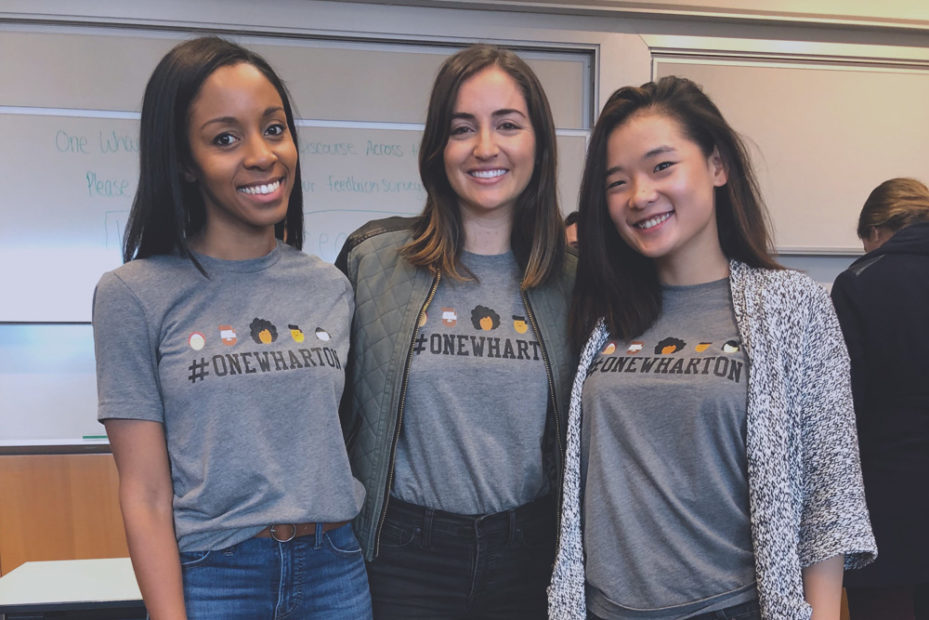Since 2015, Wharton’s student-led diversity coalition Return on Equality (ROE) has dedicated one week every year to talks, workshops, and screenings to celebrate diversity across the MBA student body, while allowing students to engage with different perspectives on issues around diversity, identity, and inclusion.
“For tomorrow’s leaders, I think One Wharton Week reminds us of the people component of managing firms, and some of the issues that may arise from managing diverse organizations after we graduate,” said ROE Co-President Kristina Sowah, WG’19.

Kristina and fellow co-president Sophie Romans, WG’19, said this year’s programming has expanded even further through a new collaboration with the McNulty Leadership Office, as well as securing speakers beyond Wharton and Penn and adding an international focus to the Week’s traditional small group dinners.
From One Wharton Week 2019, here’s a look into a few noteworthy events.
Immigration, Innovation & Entrepreneurship
On Tuesday, February 26, students gathered in Huntsman Hall for Management Prof. Exequiel Hernandez’ presentation on immigration and economic growth. The lecture covered objective findings of research studies on the impact of high- and low-skilled immigration on wages and job growth and prompted students to form their own opinions on whether they agree or disagree with current policies.
For example, research shows that high-skilled immigrants on average actually have a high rate of entrepreneurship and positively impact wages and employment for both college-educated and non-college-educated natives. As for low-skilled immigration, there is little evidence of negative effects on the wages and jobs of native-born Americans. During the post-lecture Q&A, Prof. Hernandez noted that the impact on individual communities could also differ from the average, with some losing out and others benefitting significantly.

Political Discourse Across the Aisle
Dr. Ron Granieri’s presentation on American Conservatism and American Liberalism on February 27 was standing room only. The discussion focused on the value of engaging with opposing ideas in the current political landscape.
Labels can be harmful, said Granieri, who is director of research and a lecturer in international studies at the Lauder Institute. “To assume that a conservative is XYZ is to cut yourself off from the possibility of understanding the complexity of other people’s positions.”
Although technology has made more information available, people are limiting themselves to a small scope of ideas. Granieri suggested seeking out outlets that disagree with personal views in order to understand the arguments being made. “Don’t seek a well-balanced book,” he said, “seek out a well-balanced library.”
He added that being conservative or liberal isn’t mutually exclusive. In order to progress, everyone needs to embrace open discussion, tolerate disagreement, and understand that there can be multiple answers to divisive problems.

Mentorship in the World of #MeToo
Since the rise of the #MeToo movement, some men have grown wary of forming close relationships with female coworkers, and that trend has led to junior women losing out on valuable mentorship opportunities. On February 27, Practice Prof. Cade Massey of operations, information, and decisions asked MBA students to look at three troubling mentorship scenarios submitted by women and to brainstorm potential solutions.
Students debated intent and subconscious bias, whether female mentees should be expected to confront their mentors, and building safer conversation spaces. MBA Vice Dean Howard Kaufold joined the discussion and pointed out similar concerns in higher education, where male professors can be reluctant to hold office hours.
The consensus: while conversations and solutions are difficult, the easy way out is not trying at all. Not only can colleagues try to support each other in tough situations, mutual understanding can also help avoid unreasonable conflict.
See the full schedule for One Wharton Week 2019.
— Elis Pill, Erin Lomboy, and Gloria Yuen
Posted: March 14, 2019



















